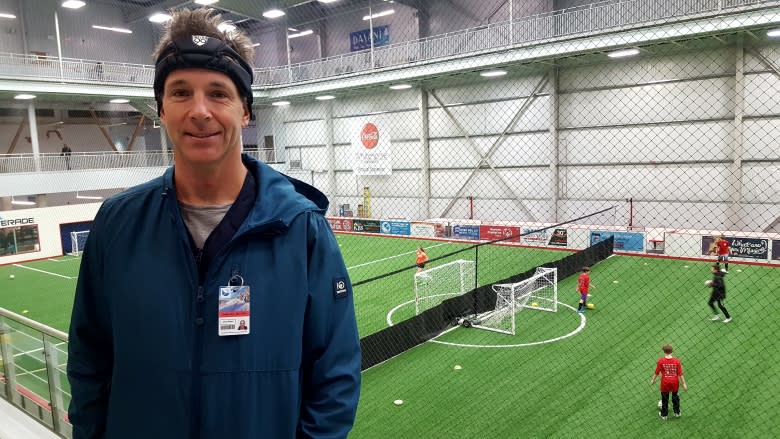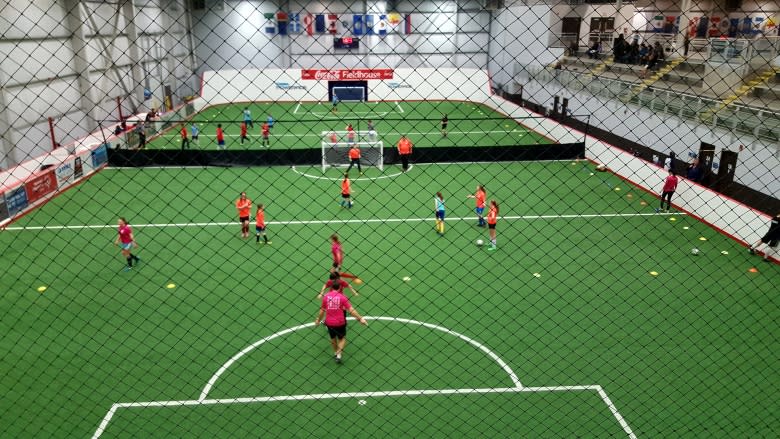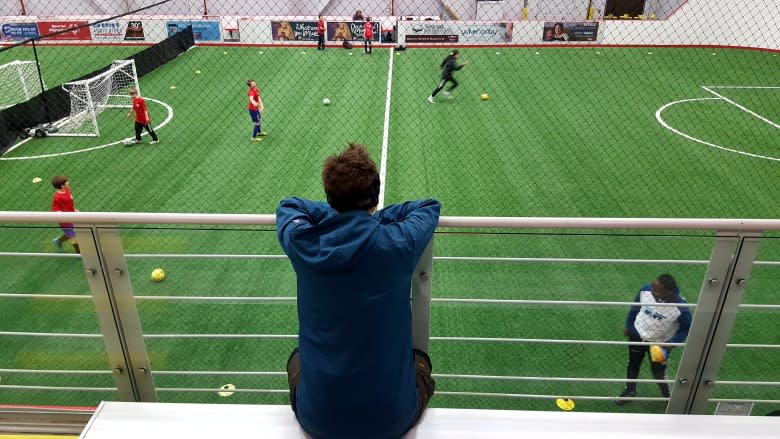Concussions changed his life, now he wants to change soccer
In 2012, Chris Ross was on top of the world.
He was making good money working full-time for the Yukon government, had just finished building some rental suites with his wife in downtown Whitehorse, and was in great physical shape.
Then, while playing in a rec soccer game in an over-35 league, things would change forever.
"One Saturday morning — just the wrong angle, the wrong time, the wrong position, the wrong place," Ross recalled.
Going for the ball at midfield, he was blindsided by an opposing player's headbutt to the temple. Ross had taken his fair share of knocks in three decades of playing soccer, but this one immediately felt different.
"I felt a shock that ran from my temple, down through my brainstem, and down to my left toe — like I stuck my finger in a light socket," Ross said.
"I know what a concussion feels like. I used to swallow them for breakfast. This was different, it just wasn't the same."
Six years later, he is still recovering from that injury, and trying to adjust to his new reality. He's also pushing for changes in how soccer is played in Canada, to help others avoid the same fate.
Cumulative damage
Ross says the hit he suffered in 2012 wasn't the hardest he'd ever received, but the damage was probably made worse by all the other hits he'd received over the years, playing the game. He compares a head to a brick wall, saying it can only take so many blows before it suffers lasting damage.
"I've lost everything," said Ross. "I've had to rebuild everything, work, trying to find different ways to make up for the loss of cash, family — my wife and I broke up, so I've been on my own. The isolation is tough."
Ross played soccer at a very high level. Teams he was on won city championships in his native Calgary. He attended the University of Calgary on an athletic scholarship and won a provincial title in 1991.
In a photo on his Facebook page, Chris captions the Calgary team picture with, "Ah! Glory days. Worth every concussion, tear, dislocation and sprain."
Over the course of his career, Ross figures he's headed a soccer ball between 200,000 and 300,000 times, and he believes that contributed to his problem.
Recent research by medical professionals suggests the risk of developing Chronic Traumatic Encephalopathy (CTE) — a brain degeneration disease — isn't related to the number of concussions a person suffers.
But Dr. Raj Bhardwaj, an emergency room physician in Calgary, says a new study published in Brain, a peer-reviewed journal of neurology, suggests repeated blows to the head — for example, by heading a soccer ball — can lead to CTE, even without concussions.
"As we don't know so much, I think we need to sit down and say look, we don't know how to treat this, we don't know how to prevent it, other than avoiding the hits," says Bhardwaj. "I think it's time to sit down and have a risk-benefit analysis."
'Why do we have to play this way?'
"Heading in the game is thuggery more than skill," said Ross. "I just don't see a place for it, I never saw a place for it. It's scary. Why do we have to play this way?"
When Ross met with an osteopath after his rec league hit in 2012, she told him he'd suffered more concussions than anyone she had ever treated. She stopped counting at 20.
In 2013, a year after his injury, Ross sat at his computer screen and hoped he was better. Already having been off work for 10 months, Ross went back. He thought he was ready.
He wasn't.
"Every time I moved my eyes back and forth across the screen I would go into fight or flight mode. Go to the end of the line, breath in and out, go to the end of the line, breathe in and out ... every single line, just trying to calm myself."
Ross managed to fake it at work for eight months. Then one day his boss tapped him on the shoulder and told him he was done.
"He said he could see it in me — I just couldn't do it anymore."
Pushing for change
Ross wants to see changes made to the game of soccer, so nobody has to go through what he has. He suggests mandatory head protection, or an all-out ban on heading.
Ross now wears a $15 piece of protective equipment called "The Full 90," whenever he skis or bikes. He even jokes that he wears it sometimes when he drives. The foam headgear wraps around the skull.
"The game has to keep evolving. Why not make it mandatory ... end of story," says Ross. "Make everybody wear this."
Ross knows it's unlikely that heading would be banned from the world's most popular sport, but he points to the policy Whitehorse Minor Soccer has adopted, where heading is not taught.
"The game continues, it hasn't meant the end of soccer," says Ross. "None of the kids are heading, and they don't even question it. If the ball comes at their head, they just move out of the way."
Stephanie Mostyn, whose 10-year old son Quinn plays soccer in Whitehorse, likes the idea of a ban on heading. She says although they don't teach the kids to head the ball, it still happens in the game.
"The kids do like to try to head the ball, because they think it's cool and they see the professionals doing it. Not knowing the skill, almost makes it worse."
'It comes in waves'
Ross, 48, says he is learning how to manage his new life, but it hasn't been easy.
"It comes in waves, I still don't know what the triggers are. I can be sitting at home and all of sudden I'll just get a wave of tears — it'll just hit me, this wave of sadness," says Ross.
"I don't know if I'm going to wake up the next day ... I really don't."
Still, he remains optimistic. He is writing a book of poetry and has a publisher. He exercises regularly, as his doctor has advised him.
"Thank God, Dr. Stewart would not prescribe opioids, or OxyContin," he says. "She said that's a terrible thing for you, it won't help, and you are just going to end up with an addiction ... she was probably right."
Ross has arranged to donate his brain to Boston University's CTE research program following his death.
He doesn't play soccer anymore, and it's left a big void in his life.
"There's nothing more exciting than scoring a goal. I loved scoring goals, I loved winning," he says.
"More importantly than that, I liked being part of a team — the social atmosphere, just getting together with the guys, just playing soccer and forgetting about everything else ... that's what I miss the most."
Correction : An earlier version of this story misidentified Ross in a 2011 photo with his over-35 men's team. The caption also said incorrectly said that Ross was wearing protective headgear.(Feb 05, 2018 2:39 PM)




